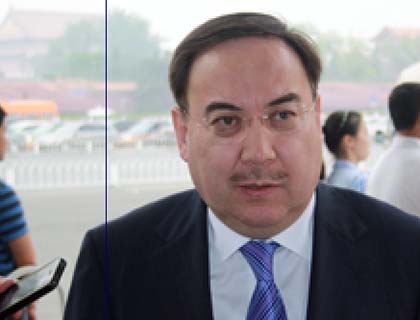In the wake of the first meeting of the Foreign Relations Council under the MFA, Kazakhstan Foreign Minister Yerzhan Kazykhanov gave an interview to the KP. - What started the Foreign Relations Council? - As you know, in April an expanded board meeting of the Foreign Ministry was held under the chairmanship of President Nursultan Nazarbayev, where he specified foreign policy areas and tasks ahead to the Ministry, including the establishment of the Foreign Relations Council.
Under the on-going complex transformation processes in the world associated with the crisis in the global economy and turmoil in many countries, of increasing value is the analytical and forecasting work, involvement in it of the national and international experts in foreign policy.
That is what the established council will be busy with as a consultative body under the Foreign Affairs Ministry. It will develop expert recommendations on the implementation of the foreign policy and international initiatives of our country.
- What about own experts in foreign policy? Who are the council's members?
- Independent Kazakhstan is only 20 years old, but despite this, it has own foreign policy experts on various university faculties, research institutions, as well as independent experts. However, the Council of the MFA acts as a partner, not as an alternative to the current scientific and analytical centers.
The Council members -leading foreign policy experts - are working today, not only in research teams, but also in state bodies. These are members of the Presidential Administration, Security Council, Parliament, Kazakhstan Institute of Strategic Studies under the President, Institute of Diplomacy, the Institute of World Economics and Politics with the First President Foundation and of major national universities and research institutes.
- Will you specify the tasks the Foreign Relations Council pursues?
- The main activity is analyzing and forecasting the trends in world politics and economics and their impact on our country, compiling info-analytical materials on Kazakhstan's foreign policy, developing propositions and recommendations on specific foreign policy initiatives on specific projects and preventive diplomacy, promoting a positive international image of the country, and others.
By forming this structure, we have initiated the cooperation of the expert community with practical diplomacy, and Kazakh researchers in foreign policy are now given an opportunity to test their research in practice. In turn, the diplomats have access to the intellectual products of leading national experts. It is no exaggeration to say that together we constitute a "think tank" of the republic's foreign policy.
- What are the planned focus areas?
- Identifying specific research projects will be prioritized, on most widely discussed international topics of concern to the Kazakh public, it is assumed.
And the topmost interest areas in foreign policy are the invariable strategic priorities of Kazakhstan - Cooperation with Russia, China, U.S., EU and Central Asian states.
The Council will analyze possible risks to the national security, specifically the global financial and economic crisis, the situation in Afghanistan and Iran, hazards to the Central Asian region, the problems of terrorism, drug trafficking, illicit migration and other possible threats and challenges for the country and the region at large, the Asian vector of the national foreign policy.
- Are there any equivalents to the Council on Foreign Relations?
- At present, there are a few dozen foreign policy councils in different countries that position themselves as a link between the state, the expert community, business and civil society. For example, the U.S. foreign policy Council in New York- a leading "think tank" on international issues. It includes about 4300 individuals and about 200 multinational companies on corporate membership rights. The German Foreign Relations Council, founded in 1955, has 2300 members, representing the foreign policy community.
In France, the Institute of International Relations carries out these functions, in the UK - the Royal Institute of International Relations, in Sweden- the Stockholm International Peace Research Institute, Belgium - Brussels Centre for European Studies. Creating the Foreign Relations Council at the MFA, we certainly studied the related international experience and issued from Kazakhstan's foreign policy requirements.

